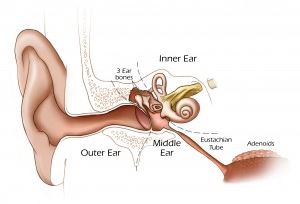Tinnitus
Tinnitus is the perception of sound experienced by a person as noise in the absence of external noise. Tinnitus is not a disease itself. The sound can be buzzing, hissing, whistling, roaring, ringing, humming or hissing. It can be continuous or occur intermittently. It may be pulsatile or non-pulsatile. Tinnitus does not have to dramatically affect your quality of life. You should avoid focussing too much attention on your tinnitus. Avoid excessive noise, find relaxation and stress management techniques that work for you.
Approximately, 17 to 20% of Australians suffer from some degree of tinnitus, varying from mild to severe. It is common for a person's to be affected by stress or tiredness.
Tinnitus can be triggerred along the auditory pathway. The majority of patients have tinnitus due to hearing loss at the cochlea or cochlear nerve level. PET scanning and functional MRI studies indicate that the loss of cochlear input to neurons in the central auditory pathways (such as occurs with cochlear hair cell damage due to ototoxicity, noise trauma or a lesion of the cochlear nerve) can result in abnormal neural activity in the auditory cortex causing tinnitus.
Eustachian tube dysfunction
Eustachian tubes are small passageways that connect behind the nose to the middle ears. When you sneeze, swallow or yawn, the Eustachian tubes open to allow air to flow in and out. However, sometimes, Eustachian tubes can become blocked which is called Eustachian tube dysfunction. When this happens, sounds become muffled and your ear may feel full.
The most common causes of Eustachian tube dysfunction is caused by cold (flu) or sinusitis.
Most of the time, the Eustachian tube dysfunction will resolved without any treatment.

Medicare rebate claiming
Here is the step by step on how to claim Medicare rebate after payment for medical fees.
1. Download Express Plus Medicare from Google Play or Apple Store.
Eczema
Eczema is a common skin condition affecting people of all age. The affected skin becomes dry, red and itchy. Sometimes, these affected areas of skin can become cracked, weepy and then scab over.
Eczema can be well controlled with appropriate skin care and topical cortisone treatment will need to be continued for many years.
Eczema can affect any part of body. Common areas affected are at flexural areas such as elbows, wrists, knees and ankles. Certain occupations involving hands washing, cleaning, handling tools and etc can cause Eczema rash on palms and fingers. In severe form of Eczema, the rash can cover the whole body. In rare situation, severe Eczema covering the whole body can cause Erythroderma (intense and widespread reddening of the skin due to inflammation causing skin to peel off in scales or layer which can sometimes be life threatening).
